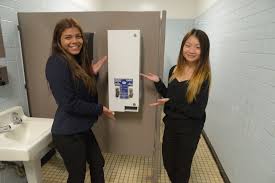The “Tampon Tax” Effect Extends to Public Schools, Including Palm Beach County

Schools in New York and a few other states have free feminine hygiene product dispensers in their girls’ restrooms.
A topic that is rarely ever mentioned in public yet affects roughly half of the human population: menstruation. Girls’ periods are still treated as somewhat of a societal taboo. Fears of accidental stains at school can be a nightmare for teenage girls. However, increasing calls for the elimination of economic burdens such as the “tampon tax” and the provision of free hygiene products in public bathrooms could be signalling a shift in how this monthly problem is dealt with.
The so-called “tampon tax” is the sales tax placed on hygiene products such as pads and tampons. According to the Washington Post, most states tax the purchase of “all tangible personal property” but exempt certain “necessities,” or non-luxury items that may include groceries, medical purchases, and clothes. Opponents of the tampon tax claim that female hygiene products should be considered necessities rather than luxuries since they are required for an uncontrollable biological process. Cristina Garcia, a California assemblywoman who introduced legislation to end the tax, points out, “I can’t really see any other product specifically for men that is comparable.”
Garcia also declares, “Women have no choice but to buy these products, so the economic effect is only felt by woman [sic].” Luckily, new bills are being introduced in state legislatures to address this concern. Currently there are eleven states that have eliminated the tampon tax: Minnesota, Illinois, Nevada, Pennsylvania, New York, Massachusetts, Maryland, New Jersey, Connecticut, Florida, and Ohio. There are even countries that have dropped the tax, Kenya being the first in its effort to make hygiene products more affordable. Canada, India, and Australia have followed.
The topic even got some viral attention back in April 2018 when Parkland activist Cameron Kasky tweeted photos of his clear backpack with a big box of tampons inside. The clear backpacks were part of a new safety initiative, but some students took it as an opportunity to make a statement. Kasky tweeted, “I only got lights. … Getting supers for tomorrow. Sizes, pricing… I’m learning new things about women’s health right now. This stuff is expensive. Steps must be taken to make these health products easier to access.”
The concern about the cost of menstrual products lies in the inability of some low-income families to purchase them. Not having enough pads or tampons on hand can pose a serious problem for any girl at school, but especially for those who might struggle to afford them. Olympic Heights senior Natalia Vallejos says, “Good hygiene products can be very expensive. I’m sure there are families with scarce resources or with a large number of family members that struggle with getting them, as they need to supply for other basic needs. Such inability to access these products can impact a girl’s performance at school or work by causing her to be absent or constantly worried for any possible staining.”
According to the Free the Tampons Foundation, students without access to pads or tampons have difficulty concentrating in class and are sometimes forced to miss class or skip school altogether. OH junior Alyson Garcia agrees with this, saying that it can “definitely result in discomfort and, consequently, a challenge to one’s focus.” This could naturally have an adverse effect on grades and overall educational success. Millions of girls worldwide miss school while menstruating, and repeated absences can end up having an economic cost on their lives. Not being able to go to the bathroom during class or not having sufficient supplies to change also means that some students use menstrual items for long stretches of time, putting them at higher risk for cervical cancer, toxic shock syndrome, and other health issues.
For this reason, some states have started to pass laws requiring public schools to provide hygiene products free of cost. In California and Illinois, public schools meeting certain criteria must provide feminine products in at least half the bathrooms on campus. New York was the most recent to announce that all public schools must dispense free tampons and pads for girls in sixth to twelfth grade, with Governor Andrew Cuomo tweeting last year, “Menstrual products are as necessary as toilet paper and soap, but can be one expense too many for struggling families.”
OH assistant principal Mr. Frank D’Annunzio asserts, “There are no plans in our immediate future that I have heard of that we are going to have any type of dispensers for feminine products in the ladies’ restrooms. If any of our girls need anything, we do have supplies in the nurse’s office.” While this is helpful, some advocates believe it is not yet enough; the founder of Free the Tampons believes that “sending a girl to the nurse’s office as if they’re sick is the wrong signal to send.” D’Annunzio also notes, “In guidance, we have a whole supply of personal hygiene care for boys and girls that we readily distribute if kids need anything. Not just here at school, but if they might need something at home, we’re able to provide it for them.”
Voicing her opinion, Alyson Garcia states that “free hygiene products should be available in public school bathrooms for convenience purposes as well as comfort for those who need them.” Free the Tampons found that 81 percent of women have gotten their period unexpectedly and didn’t have the supplies they needed, so knowing that a backup is available in the restroom would surely be reassuring.
Looking at schools is only the start of a far-reaching issue; limited access to hygiene products is also a big concern in homeless shelters and correctional facilities. This movement for so-called
“menstrual equity” also relies on better reproductive health education for both girls and boys. A lack of information only reinforces myths and stereotypes about girls and their bodies. Improving education is likely the only way to truly tackle the period stigma.










